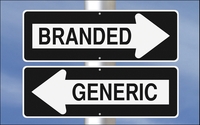Name Brands? Consumers Like 'Em Less Than Ever
- by Sarah Mahoney @mahoney_sarah, May 3, 2014

Deloitte has just released its latest peek into America's pantry, and what it finds should terrify national advertisers. Private-label brands, which gained so much ground during the recession, are still drawing new fans: It reports that 88% of consumers now swear by store brands, and say they have found many private-label products just as good (or even better) than their former favorites.
The study, based on 4,025 American adults, looked at 375 different brands in 30 categories. It also reports that 71% believe they are spending less on their grocery bills, without sacrificing much. And only 31% say brands can be a “must have,” something they’d buy whether it was on sale or not.
And while people say store brands are either the same or better in 28 of those 30 categories, they tend to remain committed to brands (regardless of price increases) in four areas: Beer, soft drinks, pet food and coffee. They are least likely to care about brand names in bottled water, tabletop disposable paper products, food storage, deli meats, condiments and salty snacks.
advertisement
advertisement
“National brands are pressured on all sides, from persistent consumer frugality and low brand loyalty to rival and store brand competition,” says Pat Conroy, vice chairman, Deloitte LLP and U.S. Consumer Products leader, in its release of the new data. “While consumers initially resented buying less-expensive products out of necessity, they have shifted from a feeling of settling for lower-priced brands to settling into store brands distinguished by high quality.”
In addition, he adds that in many categories, brands suffer “from a crisis of the similar,” giving consumers no compelling reason to choose their product instead of a store brand.
Overall, 91% of those in the survey describe themselves as more resourceful. It broke shoppers up into four categories, led by spectators (32%), who have the highest income, are most brand loyal, and also most motivated by convenience; super savers (26%), who are most likely to use mobile and online for price comparisons; planners (23%), who save big by thinking ahead, and sacrificers (19%), who are least brand loyal, have the lowest income, and seem more resentful at “having” to buy store brands.
Deloitte's findings square with the latest tallies from the Private Label Manufacturers Association, which says that through the end of 2013, as tracked by the Nielsen Co., store brands’ share of America's shopping carts are at record highs. In grocery stores, private label brands' unit and dollar shares rose to 23.4% and 19.4%, respectively. Across all outlets combined, which includes Walmart and other mass merchandisers, club stores, dollar stores and military exchanges, shares moved up to 21.2% in units and 17.5% in dollars.
The trade group says that since 2011, annual sales of store brands in supermarkets have advanced 3%, and
risen 9% in drug stores. Across all outlets, annual sales have added 5%.
Image courtesy of Shutterstock.



The USA has lagged the UK development of retail own brands for ever - it's a consequence of the highly concentrated nature of UK retail vs USA's fragmented industry structure.
However, after years of seeing retail brand development as a one-way bet, with manufacturer brands losing, the economic downturn is leading to a more nuanced position.
Major brands, fighting for survival are investing heavily in price, narrowing the gap between national and retail brands, and reducing the attractiveness of retail brands propositions.
The poor results issued last month by Robert McBrides, the leading European retail brand manufacturer of home and personal care lays testimony to this.
In premium Ready to Eat, Ready to Heat, Ready to Cook food - retail brands are the de facto brands: M&S Food, Tesco Finest etc have innovated in the absence of any recognised branded food company.
There are two new threats to house brands as we understand them. Led by Tesco's "good, better best" tiering - retail own brands in the UK are multi-dimensional spanning discount to finest propositions; there is way too much duplication / complexity and this destroys consumer value.
Second is Amazon - who provide a more fundamental threat to retail brands. For more on these topics can I direct you to my blog www.retailiation.com and 3 pieces: "Aldi:Taking The Tinned Tomato Test"; "Cleaning up after own brands"; and "Imagine"...and if you'd like to discuss how to respond to these challenges you can reach me at gary.carp@kantarretail.com